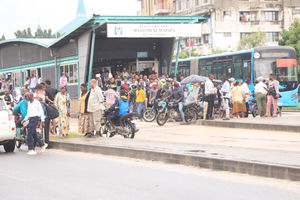Day by day, progress is made in women’s rights

Bunda Urban MP Esther Bulaya waves back to her supporters during her tour of her constituency in August last year. Against the backdrop of male chauvinism in her society, she won the seat in the 2015 General Election. PHOTO | FILE
What you need to know:
- For some it came as a pure surprise because of the notoriety of the Mara region as far as women rights issues are concerned. There region is infamous for carrying over cultural practices based on a patriarch system that have been the subject of untold suffering to women; from women battering to female genital mutilation.
Musoma. When two women politicians from the opposition party Chadema emerged victories in parliamentary elections in the 2015 General Election in Mara region many Tanzanians were thrilled.
For some it came as a pure surprise because of the notoriety of the Mara region as far as women rights issues are concerned. There region is infamous for carrying over cultural practices based on a patriarch system that have been the subject of untold suffering to women; from women battering to female genital mutilation.
But that fateful October Esther Bulaya and Esther Matiko won elections for Bunda Urban and Tarime urban constituencies respectively. Ms Bulaya, who had crossed over from the ruling party, CCM where she had served in Parliament, previously, through the special seat arrangement, battled for the seat with a seasoned politician and a long-time cabinet minister, Stephen Wassira. Ms Matiko carried a constituency that has been, traditionally, won by the opposition since the first multiparty democratic elections in 1995 but which, however, is very competitive because of CCM’s efforts to take it back. In fact the ruling party took the constituency in 2010 General Election but lost it again to Chadema in 2015.
And yet the victories of the two women cannot be taken to mean a seismic shift in women rights in Mara region. Many ordinary women still live in a system that makes their lives, at times unbearable, simply because they were born women.
But the victories of Ms Bulaya and Matiko show some steady progress made in Mara region, as a product of sensitisation campaigns, on women’s rights.
Mr Didi Koko, a political analyst based in Musoma, says that Mara region has made progress on women rights in areas of politics and public administration despite challenges of continued gender based violence incidents in the region.
Mr Koko says it is such progress that explains the political victories of the two women Members of Parliament.
“As you can see both of them have been active in the development of the region. They are also very active in Parliament where they speak candidly in support of the region. This shows that they have the ability to perform their duties and that their being women is not a hindrance,” he says.
Mr Koko progress in Mara on women rights was caused by various factors including campaigns by women rights activists and other educative campaigns conducted by various government agencies.
Progress in good governance has also made a difference Mr Koko adds, saying that in Mara government officials have been working together with wananchi regardless of their gender differences.
People in Mara region have also been influence by progress in gender equality taking place elsewhere Mr Koko says.
Mr Fazel Janja, another Musoma-based analyst, says the society in Mara is changing, slowly but steadily, as far as women rights is concerned.
“The gender violence was very high but nowadays the situation has changed and that’s why you can now see women holding political posts within the region. We now have women legislators, district commissioners, heads of departments and councillors,” he explained.
Mr Janja says that most of the progress is attributed to campaigns carried to end gender violence and FGM.
Mrs Pilli Wambura, a Musoma resident, says that she is proud that women are “breaking the glass ceiling in Mara.”
She says that in order for women to be recognized and be given more responsibilities women must support one another and unite setting aside their political ideologies.
She says that women have great contributions towards sustainable development and, using their numerous position in society, they can make a difference.
Mara region is among regions with the worst record of gender based violence in Tanzania.
Traditionally Mara region were being regarded as men’s property after marriage. Battering of women was allowed and even expected. They were not allowed to speak in front of men since it was believed that they belonged to the kitchen. Their main duties were to bear and raise children and work on farms.
During harvests the farm produce belonged to men and it is they (men) who had to decide how much to sell and how much should be left for community consumption.
After much efforts by the government the civil society most of the prohibitive cultural practices have been abandoned.




